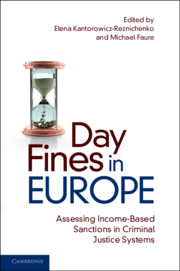Book contents
- Day Fines in Europe
- Day Fines in Europe
- Copyright page
- Contents
- Figures
- Tables
- Contributors
- Acknowledgements
- Abbreviations
- 1 Introduction
- 2 Theoretical Perspectives on Day Fines
- 3 Day Fines in Finland
- 4 Day Fines in Sweden
- 5 Day Fines in Denmark
- 6 Day Fines in Germany
- 7 Day Fines in Austria
- 8 Day Fines in Hungary
- 9 Day Fines in France
- 10 Day Fines in Portugal
- 11 Day (Unit) Fines in England and Wales
- 12 Day Fines in Slovenia
- 13 Day Fines in Spain
- 14 Day Fines in Poland
- 15 Day Fines in Croatia
- 16 Day Fines in Switzerland
- 17 Day Fines in Czech Republic
- 18 Day Fines in Romania
- 19 Comparative Law and Economics Perspective on Day Fines
- Index
- References
3 - Day Fines in Finland
Published online by Cambridge University Press: 11 June 2021
- Day Fines in Europe
- Day Fines in Europe
- Copyright page
- Contents
- Figures
- Tables
- Contributors
- Acknowledgements
- Abbreviations
- 1 Introduction
- 2 Theoretical Perspectives on Day Fines
- 3 Day Fines in Finland
- 4 Day Fines in Sweden
- 5 Day Fines in Denmark
- 6 Day Fines in Germany
- 7 Day Fines in Austria
- 8 Day Fines in Hungary
- 9 Day Fines in France
- 10 Day Fines in Portugal
- 11 Day (Unit) Fines in England and Wales
- 12 Day Fines in Slovenia
- 13 Day Fines in Spain
- 14 Day Fines in Poland
- 15 Day Fines in Croatia
- 16 Day Fines in Switzerland
- 17 Day Fines in Czech Republic
- 18 Day Fines in Romania
- 19 Comparative Law and Economics Perspective on Day Fines
- Index
- References
Summary
In 1921, Finland was the first Nordic country to introduce the day fine system into its system of criminal sanctions. The main reason for adopting the new system was an attempt to introduce a system where fines would have an equal impact on people with varying means.An important objective of the total reform of Finnish criminal law (1980–2003) was to reduce of custodial sentences and, therefore, the increased use of financial sanctions had a preference. In a comparative analysis day fines are imposed to very great extent in Finland.There has been a general satisfaction with the fining system in Finland.The efficiency of the day fine system has been furthered by the detailed provisions on the assessment of the person’s income and the effective enforcement of fines. As for the future of the fining system, there is an urgent need of coordinating various punitive pecuniary sanctions (whether they are criminal in nature or administrative and whether they are day fines or fixed fines).
Keywords
- Type
- Chapter
- Information
- Day Fines in EuropeAssessing Income-Based Sanctions in Criminal Justice Systems, pp. 24 - 43Publisher: Cambridge University PressPrint publication year: 2021
References
- 1
- Cited by

